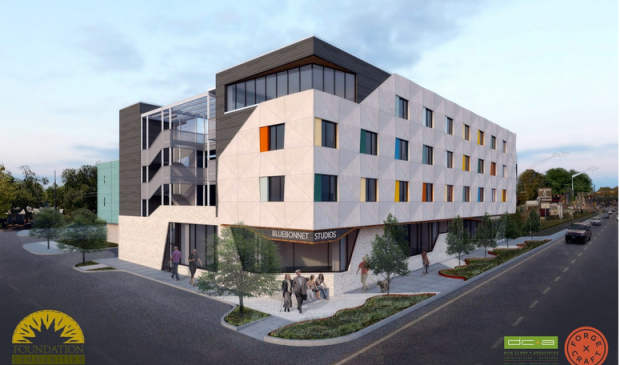Court denies injunction against Foundation Communities
Thursday, November 5, 2015 by
Elizabeth Pagano How much havoc can one neighbor wreak on a $20 million affordable housing project backed by federal, state and local governments and nonprofits? Potentially, quite a bit.
On Tuesday, Foundation Communities avoided potential disaster for its Bluebonnet Studios on South Lamar when Judge Rhonda Hurley denied an injunction that would have stopped construction on the project indefinitely. Michael Sullivan, who owns the adjacent apartment complex, is appealing a unanimous Board of Adjustment ruling. That ruling upheld staff’s interpretation that the use at 2301 South Lamar will be “congregate living.”
That lawsuit is still pending, but in the meantime, Sullivan and his attorney, George Slade, were asking that construction be stopped and seeking a temporary injunction to do just that.
Kirby Baird, president of the Austin division of SpawGlass, testified that the construction costs associated with an injunction would be substantial, estimating the four-month costs to be $1,387,409.
But the ultimate cost could be much greater than that, explained Foundation Communities Executive Director Walter Moreau. Federal funding comes with a deadline, and Moreau said that the organization is required to complete construction by December 2016 or it would lose $9 million in federal tax credits. It also stood to lose about $20 million that comprises their funding, which includes more than $3 million from the city of Austin.
“It’s a cliff,” said Moreau. “We have to open the building by the end of next year, and we are on a tight time frame to get that done.”
That argument didn’t sway those asking for the temporary injunction.
“With regard to cost to commence construction and cost to resume construction, I work with lots of developers. I’m sorry, that’s just the cost of doing business,” said Slade. “Had you done a regular multifamily zoning classification, you wouldn’t be here.”
Sullivan argued that city code requires the city to stop construction of Bluebonnet Studios during the time that his judicial review remains pending, not just during the time appeal is pending at the Board of Adjustment, as the defense maintained.
“Appeal means what appeal means,” said Slade. “Frankly, it’s better off for everybody that they do not get in any further in this project than they have to be, if I am going to be successful and my appeal is going to be granted.”
Graves, Dougherty, Hearon & Moody attorney Michael Whellan was representing Foundation Communities. In his brief, he said the distinction between an “appeal” and seeking judicial review was clear under city code. He wrote, “(I)ndeed, it would be strange if the Legislature and the City intended that a disgruntled neighbor could automatically and indefinitely delay construction of a project that has received final approval through the City’s appellate process. The City Code and the governing statute make clear that is not the case.“
Further, Whellan argued that Sullivan would not suffer “imminent and irreparable harm” before trial that could be prevented by a temporary injunction. Instead, Sullivan’s complaints about parking and dumpster placement have been about what will happen after the project is completed. However, Sullivan testified that his fence had been damaged by construction, and he suspected workers had trespassed on his land.
Whellan also made the point that in order to ultimately succeed in his case, Sullivan must meet a very high bar. He explained, “(T)he Court’s standard of review of the Board of Adjustment’s ruling is extremely deferential: Sullivan must show that the Board’s decision was ‘illegal’ and made ‘without reference to any guiding rules or principles.’”
Though the hearing was on the merits of the injunction, there was some discussion of that larger case and Sullivan’s objections.
“I support affordable housing. It may not seem that way, coming in here and suing these folks, but I do support affordable housing,” said Sullivan.
However, in this instance, Sullivan maintains that congregate living use is a loophole being used to reduce parking requirements. His argument hinges on the lack of laundry and meal services planned for the studios.
Moreau said that his project meets the definition for congregate living use under code, as was determined by city staff and the Board of Adjustment. He also explained that the 35 parking spaces are adequate for the 107 studios, as the vast majority of residents will not have cars.
Though they did not testify, members of the Zilker Neighborhood Association and the South Lamar Neighborhood Association were also present in court. Bluebonnet Studios has the support of the neighborhood, which the South Lamar Neighborhood Association formally affirmed to the state during the tax credit application process.
Image of Bluebonnet Studios courtesy of Foundation Communities.
You're a community leader
And we’re honored you look to us for serious, in-depth news. You know a strong community needs local and dedicated watchdog reporting. We’re here for you and that won’t change. Now will you take the powerful next step and support our nonprofit news organization?








